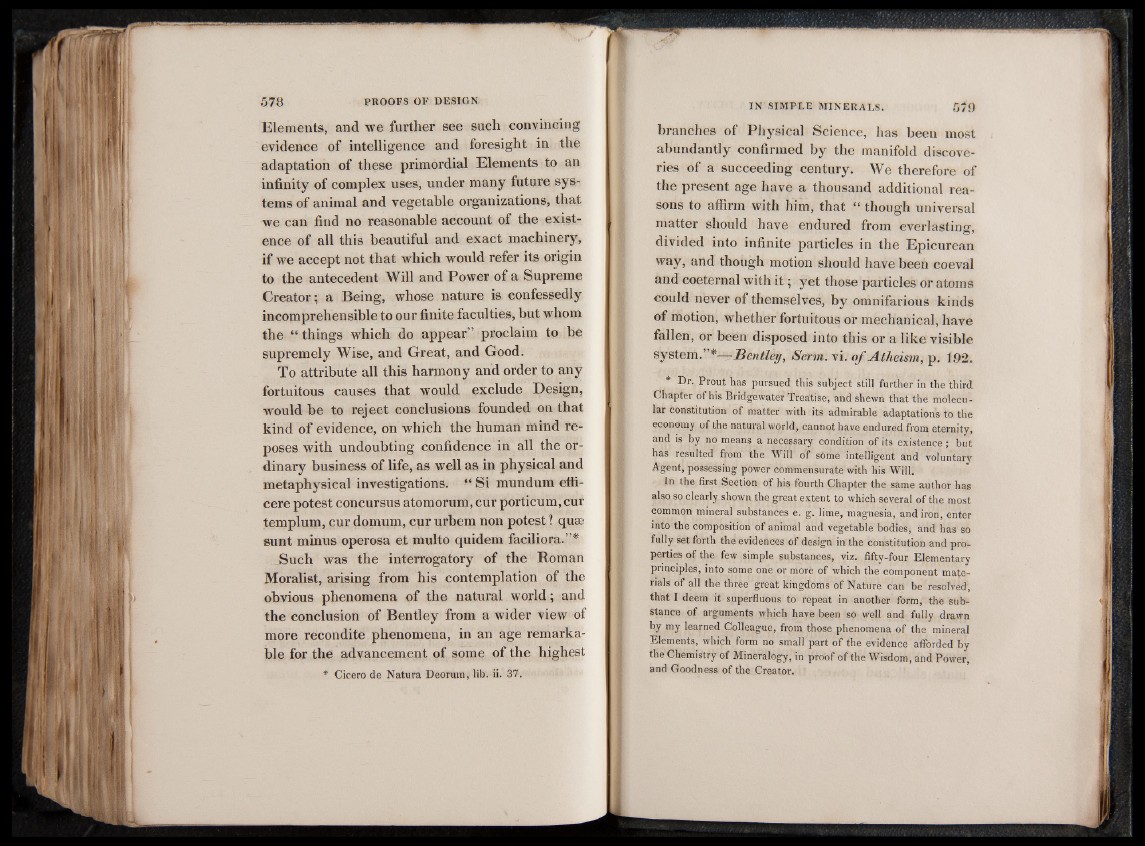
Elements, and we further see such convincing
evidence o f intelligence and foresight in the
adaptation of these primordial Elements to an
infinity o f complex uses, under many future sy s tems
o f animal and vegetable organizations, that
we can find no reasonable account o f the ex istence
o f all this beautiful and exact machinery,
if we accept not that which would refer its origin
to the antecedent Will and Power o f a Supreme
Creator; a Being, whose nature is confessedly
incomprehensible to our finite faculties, but whom
the Is things which do appear” proclaim to be
supremely Wise, and Great, and Good.
To attribute all this harmony and order to any
fortuitous causes that would exclude Design,
would b e to reject conclusions founded on that
kind o f evidence, on which the human mind reposes
with undoubting confidence in all the ordinary
business o f life, as well as in physical and
metaphysical investigations. “ S i mundum effi-
cere potest concursus atomorum, cur porticum, cur
templum, cur domum, cur urbem non potest ? quae
sunt minus operosa e t multo quidem faciliora.”*
Such was the interrogatory o f the Roman
Moralist, arising from his contemplation of the
obvious phenomena o f the natural world; and
the conclusion o f B en tley from a wider view of
more recondite phenomena, in an age remarkable
for the advancement o f some o f the highest
* Cicero de Natura Deorum, lib. ii. 37.
branches o f Physical Science, has been most
abundantly confirmed by the manifold discoveries
o f a succeeding century. We therefore of
the present age have a thousand additional reasons
to affirm with him, that “ though universal
matter should have endured from everlasting- . . O ’
divided into infinite particles in the Epicurean
way, and though motion should have been coeval
and coeternal with it ; y et those particles or atoms
could never o f themselves, by omnifarious kinds
o f motion, whether fortuitous or mechanical, have
fallen, or been disposed into this or a like visible
system Bentley, Serm. vi. o f Atheism, p. 192.
* Dr. Prout has pursued this subject still further in the third
Chapter of his Bridgewater Treatise, and shewn that the molecular
constitution of matter with its admirable adaptations to the
economy of the natural world, cannot have endured from eternity,
and is by no means a necessary condition of its existence ; but
has resulted from the Will of sôme intelligent and voluntary
Agent, possessing power commensurate with his Will.
In the first Section of his fourth Chapter the same author has
also so clearly shown the great extent to which several of the most
common mineral substances e. g. lime, magnesia, and iron, enter
into the composition of animal and vegetable bodies, and has so
fully set forth the evidences of design in the constitution and properties
of the few simple substances, viz. fifty-four Elementary
principles, into some one or more of which the component materials
of all the thrèe great kingdoms of Nature can be resolved,
that I deem it superfluous to repeat in another form, the substance
of arguments which have been so well and fully drawn
by my learned Colleague, from those phenomena of the mineral
Elements, which form no small part of the evidence afforded by
the Chemistry of Mineralogy, in proof of the Wisdom, and Power,
and Goodness of the Creator.